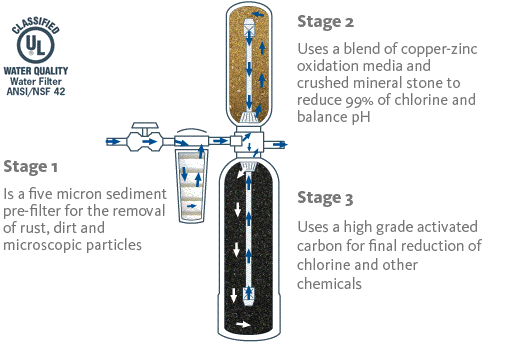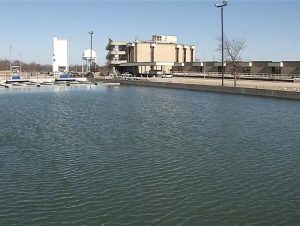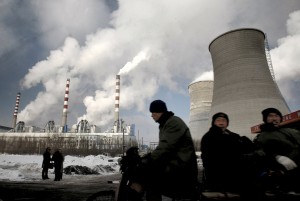Sediment Pre-Filters
Often the first step in the filtration process, sediment pre-filters use relatively coarse net-like material to catch the large rust, sediment and silt that would otherwise clog up the rest of the system.
Copper-Zinc and Mineral Stone Filter
This process, also know as Kinetic Degradation Fluxion (KDF), uses the electromagnetic forces generated between the copper and zinc in the media, along with a blend of other minerals to greatly reduce chlorine, water soluble heavy metals, and scale while also inhibiting the growth of bacteria and algae.
Carbon Filters
Carbon filters are common a common method of water filtration around the world. The most common type used in water filtration systems is Activated Carbon. This will reduce herbicides, pesticides and other chemical compounds that may be present in your water. However, China utilizes a unique chemical, chloramine, in its water supply for sanitation purposes. Chloramines, which are harmful to human health, flow right through activate carbon, and wear it out so that other pollutants will start going through as well. The appropriate type of carbon filter for Chinese water is a Catalytic Carbon Filter , which reduces herbicides, pesticides, chloramines and other chemical compounds commonly found in Chinese water.
Water Softeners & Descalers
“Hard” water is a common concern in China, as many are unhappy with the unsightly build up of minerals on dishes, appliances, etc. These mineral that make the water “hard” are not actually bad for human health, and in most cases are important sources of the body’s nutrients. Most water softeners add salt to the water to inhibit the clumping together of minerals. This technology is decades old, and decently common in China. However adding salt, even if you can guarantee the purity of the salt you are purchasing in China (generally you can’t), is not the ideal solution as far as human health is concerned. A new technology in water softening is also growing in popularity, known as SimplySoft, this technology is salt free. Instead, water goes through the softening and conditioning process using Nucleation Assisted Crystallization (NAC) technology to alter the structure of the hard minerals into a crystal structure that prevents the minerals from binding and forming scale build-up, without having to add any possibly harmful substances to your water. Current studies show NAC technology is proven to reduce scale by up to 99.6%.
UV Filters
Water passes through a filter that utilizes Ultra Violet light to eliminate bacteria and viruses that could be present in your water.
Sub-Micron Post-Filters
Often the final step of any filtration process, water passes through a filter with holes only 0.35 sub-microns wide, to capture even the smallest remaining sediment and organic particles.
The diagram below illustrates how many of the above mentioned technologies are incorporated into a whole house filter.







